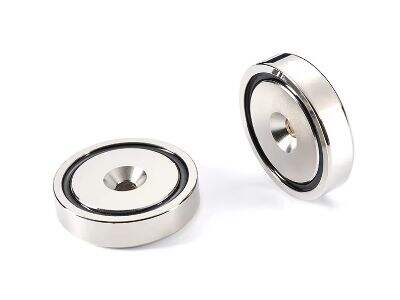Denna guide leder dig genom en grundläggande förståelse av vad magneter gör, hur man väljer rätt form och storlek på magneter XINYUAN MAGNET för ditt tillämpningsområde, och hur så många olika miljöer spelar in på prestandan hos magneter. Till slut kommer du att vara förberedd att använda magneter framgångsrikt i din projekt-design.
Grundläggande om Magneter
Så, vad är egentligen magneter? Magneter är unika saker som består av specifika komponenter som attraherar metall, inklusive järn. Detta skapar till slut ett osynligt magnetfält som omger dem. På ett mycket förenklat sätt, och det som gör att magneter 'limmar' till vissa metalltillverkade saker.
Varje magnet sägs ha ett par poler, en ände är en nordpol och den andra en sydpol. Glöm aldrig att motsatserna tilltrar varandra. Det betyder att om du har en nordpol från en magnet och en sydpol från en annan magnet, så dras de mot varandra och kommer klistra ihop. Men om du försöker sätta två nordpoler (eller två sydpoler) nära varandra, kommer de skjuta ifrån varandra – detta kallas repulsion.
Att förstå hur magneter fungerar är något värdefullt när du ska använda dem i dina projektval. En metod att illustrera detta är att om du behöver magneter för att hålla något stort och tungt, då måste du använda starka magneter. Men om du gör en hantverksprojekt kan du välja mycket mindre och svagare magneter för enklare hantering.
Välja den Rätta Magnettypen och Storleken
Du kan välja bland en bred utbud av magnetformer och -storlekar som erbjuds av XINYUAN MAGNET för ditt projekt. Några vanliga storlekar på magneter som kan vara användbara för ditt projekt är:
Blockmagneter, de är magnetiserade till ett rektangulärt (ibland också kvadratiskt) block. Med norr- och sydpol på motsatta sidor är de mycket versatila och kan användas för många olika projekt.
Ringmagneter: Dessa neodym ndfeb-magnet är cirkelformade men har ett hål i mitten. Dessa är användbara i alla projekt som involverar att skjuta något upp genom mitten.
Bågmagneter – dessa är böjda och de är en del av en cirkel. De är utmärkta för vissa design som kräver en speciell form.
Skivmagneter är rundade, platta och skivformade. De kan vara nästan vad som helst – tjocka eller tunna, beroende på vad du behöver för ditt projekt.
Exempel #1: Cylindermagneter Dessa är de rundade bilmagneter, väldigt coolt magneter som vanligtvis används i maskiner och motorer. Det finns många typer av uppgifter som de kan automatisera.
Tänk på vikten av det du vill ansluta magneten till när du bestämmer dig för storleken. Och tänk på vilken sorts utrymme du har att arbeta med. Några är mycket små, och även om de kan vara enklare att arbeta med, kanske de inte har styrkan att stödja ett större last. Stronghold magneter Större magneter kan också vara starkare, men de kommer att bli svårare att använda i trånga utrymmen.
Överväganden vid Magnetstyrka och Kraft
XINYUAN MAGNET levererar de tre huvudsakliga typerna av magneter: neodymium magneter, ferrit magneter och AlNiCo magneter. Varje typ har olika speciella egenskaper; om du är medveten om detta kan du använda en specifik enligt ditt projekt. Låt oss ta en närmare titt på varje typ:
Neodymium magneter Wow, detta är den mest kraftfulla typen av magneter överhuvudtaget. Även i sin lilla form kan de stödja vikt, och de är mycket starkare. Men du behöver en neodymium magnet om du vill ha en verkligen kraftfull magnet, och du har inte mycket utrymme för den.
Ferritmagneter. Dessa är också mindre kraftfulla än neodymmagneter men är kostnadseffektiva. De är också motståndskraftiga mot rugg och korrosion, vilket gör dem hållbara för projekt där hög styrka inte är nödvändig och kostnad är en faktor. De är lämpliga i miljöer där utrymme inte är ett problem.
AlNiCo-magneter. Dessa magneter är karakteriserade av att vara högtemperaturmotståndiga och vissa är också fria från rugg. Men de är kalla och lätt att bryta om du inte är försiktig. De alnico stavmagneter är huvudsakligen reserverade för industriella tillämpningar eller andra varma miljöer som i bilar där temperaturerna kan bli ganska extrema.
Miljökoll på magnetprestanda
Utöver de olika typerna av magnet som du bör vara medveten om, är det också mycket viktigt att tänka på var dina magneter ska användas. En magnets prestation beror starkt på dess arbetande miljö. Temperatur, fuktighet och exponering för andra magnetfält är exempel på variabler som kan påverka styrkan eller effektiviteten hos magneten.
För de flesta magneter fungerar de optimalt vid rumstemperatur, vilket är ungefär 20 grader Celsius (eller 68 grader Fahrenheit). Om du behöver magneter i verkligen heta platser måste du använda en AlNiCo-magnet som kan klara höga temperaturer (upp till 500 grader Celsius/932 grader Fahrenheit). Det gör den användbar för saker som blir väldigt hetta, såsom en bilmotor. Om projektet är under vatten, är en med en bredd av högst 150 mm ideal eftersom de inte ruster och kommer att fungera korrekt i fuktmiljöer.
Slutsats
XINYUAN MAGNET lärde du dig några saker om magneter och bestämde hur du ska välja rätt magnet för ditt projekt. Tänk på grunderna: hur magneter fungerar, rätt form och storlek för din tänkta användning, krävd magnetstyrka, omgivande miljö, och använd alltid magneter säkert i ditt design. Rätt magnet kan ta ditt projekt till en högre nivå av framgång och glädje. Trevlig magnetering.

 AR
AR
 BG
BG
 HR
HR
 CS
CS
 DA
DA
 NL
NL
 FI
FI
 FR
FR
 DE
DE
 EL
EL
 IT
IT
 JA
JA
 KO
KO
 NO
NO
 PL
PL
 PT
PT
 RO
RO
 RU
RU
 ES
ES
 SV
SV
 IW
IW
 ID
ID
 LV
LV
 LT
LT
 SR
SR
 SK
SK
 SL
SL
 UK
UK
 SQ
SQ
 ET
ET
 TH
TH
 TR
TR
 FA
FA
 GA
GA
 BE
BE
 MK
MK
 KA
KA
 UR
UR
 BN
BN


